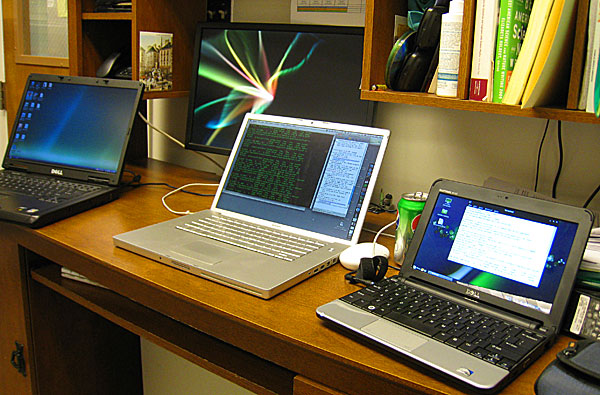We Do All Of It… Or Sometimes Not.
by Richard White
2011-06-30
Well, well, well… look who’s posting something on the HybridClassroom.com blog. It’s little old me!
I hope you’ll excuse my absence for these last 3.5 months. It turns out that that whole teaching thing requires a fair amount of time—who knew?!—and spring semester this year was a doozy. I hope to make up for lost time by slamming with you a series of posts that will leave you breathless, entertained, and elucidated.
I like to set my sights high.
We’ll start off with this one, which is actually a two-for-one deal. Here’s the first post-within-a-post:
by Richard White
2011-03-12
On some days–often the more painful professional development days, it seems–I get a little frustrated. Either the subject matter, or the process, or the guest speaker, or sometimes even something my colleagues do will cause me to metaphorically throw up my hands and say, “Why can’t they just le me do my job? I’m here to teach the children!!!”
On some other days–often at the end of a few hours banging my head against the wall with my students in the classroom–I’ll say, “You know, I could get SO much more work done if I didn’t have all these darn kids.”
I suppose it’s a “greener grass” question, but the reality is, it’s ALL part of our job. One of the challenging and exciting things about teaching is the wide variety things that are expected of us: lesson planning, teaching children, communicating with parents, participating in ongoing professional development, representing our school in the community, chaperoning dances, attending school sporting events… You can’t do it all, of course, and no one expects you to (although if you want to give it a try, ask your local administrator to swap places for a day)… but you are reasonably expected to do what you can, and not squawk too much about it in the process.
Rockclimbers have to be able to handle a wide range of different vertical terrain: smooth sloping faces, steeper faces with small holds, finger cracks, hand cracks, fist cracks, off-widths, chimneys. The really good climbers–those able to handle the widest variety of terrain–don’t practice what they’re already good at; they address their weakest areas of expertise, in order to improve in those areas in which they are most deficient. Although this ironically has the effect of making training more annoying, it’s toward the greater end of becoming a more capable climber overall.
In the same way, consider working on those areas of your profession at which you feel slightly deficient. Are you a lousy communicator? Resolve to get better at it, make a plan (any plan), start small, and start communicating today–NOW. Do you tend to get stuck in your own classroom? Get out, walk around, and visit a few other teachers, a few other classrooms. It’s a refreshing change of pace, and may have unforeseen benefits down the road.
And above all else, do you work late at night grading, at the expense of your family and friends? Burnt out and bitter is no way to survive teaching (although I’m amazed at how many people do just that). Stay balanced, and try to keep it all in perspective.
You get the irony, right? Those are my notes on an idea for a blog post from March, which was apparently just about the time that I completely dropped the ball on this blog, as well as a more personal blog that I maintain for my friends and family (although “maintain” might be a little optimistic).
Or perhaps (he said, sidling sideways), the bigger truth is that we can’t do it all, even as we struggle to maintain balance in our lives. The rockclimbing I spoke of above is almost non-existent in my life at this moment (although my training for a half-marathon is going quite nicely, thanks for asking), and my classroom teaching is on hiatus for the summer, but I have some online education projects that I’m working on.
I’m perfectly okay with making decisions like that—making mid-course corrections to one’s priorities—particularly when there are some cool things that happen as a result of that realignment.
And it’s those same “cool things” that I’ll be sharing with you over the next few posts.
Come on back and read all about it!

